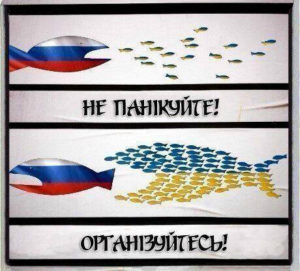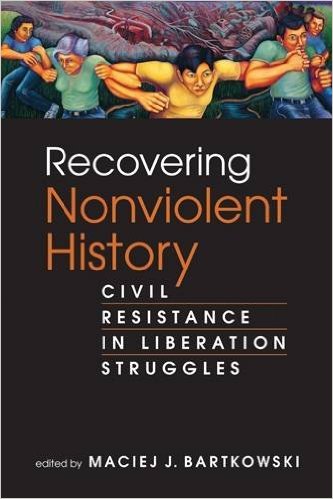Here is a compilation of my twit-length, pithy sayings, mostly about civil resistance. Their aim is to stimulate creative thinking about tenacity of nonviolent struggle and nature of political conflicts in general.
- Dictators are boring & humorless. Another reason to rebel against them.
- People that eventually won against oppression waged struggle equally with unjust rule as with themselves. They stopped acting like victims.
- Nonviolent struggle is not sprint but marathon. The last thing we want is a burnt-out movement 10 years before ultimate victory.
- Civil resistance draws out violence & shows that people’s obedience is no longer voluntary. No regime can survive without obedience.
- How to know civic activism is alive & well? When u hear: “We do not have money. We have something more valuable: our hands & minds.”
- Nonviolent struggle is about unique grassroots power. It cannot be exported or foreign born. It is in minds & hearts of the oppressed.
- Dictatorship has stronger players but successful movement prevails because its team has better strategies & discipline
- Successful nonviolent struggles are led NOT by protest movements BUT welfare movements capable of building networks of mutual trust & civic solidarity
- Mastering resilience in civil resistance? Millions develop supreme confidence in positive outcome of nonviolent struggle even though it does not seem likely in their lifetime.
- Inner voice ‘I have no choice.’ Alter voice ‘Choice is there. Imaging it craves for ur intellect or courage or both.’
- Power of authoritarians is inversely proportional to self-organization, mutual solidarity & mobilization of ordinary people.
- How to convince authoritarian brute that cost of repressing people is higher than cost of accommodation? Make him face organized society.
- Regimes often say that peaceful protests & civil disobedience are illegal. True, civil resistance breaks law to uphold rule of law. (inspired by Michael Davis)
- Nonviolent struggle is like long distance swim. Need to pace speed, regulate moves & improve technique to minimize risk going under water
- Nonviolence is not running from wrong instead it is fighting wrong with right. (inspired by Rev. James Lawson)
- Those ordered to repress activists should ask for WRITTEN orders from superiors. Nothing concerns tyrants more like evidence of their crimes
- Tactician credo: If anything can go wrong it will. Strategist credo: In the process of ‘going wrong’ there are opportunities for victories.
- Often cited as a reason for taking up arms against brutal adversary is revenge. This is shortcut to failure not strategy for success.
- How to move from spontaneous to organized civil resistance? Build networks & collaborations among different segments of society
- What is civil resistance? Self-organized, resilient, disciplined, mobilized, agile, diffused but united biopower of citizens.
- Liberating & transforming society without challenging oppressor directly. Essence of stealth civic struggle
- Civil resistance is driven by a voluntary commitment of many. Authenticity of nonviolent movements comes from that force
- Autocrats spend huge resources on trying to make civil resistance violent. Understanding why is step to victory for nv activists
- True power rests in people’s minds & thoughts
- Saying fundamental HRs are culturally bounded is like accepting different global standards for plagiarism & its permissibility
- Havel wrote about disturbing peace. Diplomats know little about it. They only practice making peace.
- Nonviolent struggle is not sprint but marathon. The last thing we want is a burnt-out movement 10 years before ultimate victory.
- How to be more effective nonviolent trouble maker? For start, let’s imagine our rebellion & check how it fits with society we want to build.
- Nonviolent resistance wins the day not because it mobilizes masses but because it imposes prohibitive costs on regime’s pillars of support.
- Nonviolent resisters succeeded in the past because they down there believed that failure was impossible.
- In civil resistance solidarity is more important than heroism. It is primacy of strategy over emotions. Victory comes from former not latter.
- Rule of law’ occludes the fact that without people’s consent no laws, institutions, elites can rule. Call for new lingua of people power.
- Gandhi, Havel, Walesa, Mandela agreed on this point: idea of political violence to overthrow dictatorial regimes is NOT radical enough.
- Resistance is about preeminence of action. Inaction is less effective than violent action. Violence is less effective than nonviolent action
- Movmts cannot transform society without doing it one breath at a time. Short goals and small victories are crucial to propel transformation.
- Journey of popular struggle is as important as its final destination. Understood it #Walesa understood it #Havel, understood it #Mandela
- For every insurmountable condition that hampers civil resistance there is a skill that overcomes that condition
- People revolutions are unpredictable because they are driven by human creativity, ingenuity & imagination that defy known rules.
- Peacemaking is far too often about pacification. What is needed instead is to energize suppressed society
- Civil resistance is iterative & protracted process of collective mobilization & organizing not merely media grabbing protests
- Saying fundamental HRs are culturally bounded is like accepting different global standards for plagiarism & its permissibility
- People know social/political problems they face. They now need alternative possibilities and knowledge of how to implement them.
- What movements do: alert, educate, serve, mobilize. If you say you have a movement, how do you do in each of these areas? (inspired by Hardy Merriman)
- Insubordination is easy to punish. Incompetence is not. Good Soldier Shvejk knew that. Anti-dictatorship activists could use his example. (inspired by Ivan Marovic)
- If I am being asked to die for a cause I say I prefer to live for it. (inspired by Kumi Naidoo)
- People activise after & only when their own rights are violated. People must act prior to their rights being violated & fight 4 rights of others (inspired by HR defender from Kazakhstan).
- In the era of junk food Gandhi’s wisdom “your food must be just enough to keep your mind and body in good order. Men becomes what he eats.”
International recognition of nonviolent movements
- International community gives awards to single pro-democracy activists. It is yet to recognize pro-democracy movements. We see towering trees but not majestic forests.
- Time to change it: No multilateral document recognizing contribution of nonviolent movements to democratization processes.
- Right to civil resistance has not yet been raised to the level of a universal human right. Can this be done & how?
- Perfect dilemma for Chinese censors? Democratic movement in China adopts & reclaims ‘Xi’ & ‘Jinping’: 习 or 近 or 平 or combination

- Umbrella movement activists reclaim President Xi Jinping for their struggle. Chinese censors in tough spot, need to censor their boss.
- NPR: ‘Protest became violent in Hong Kong’ & all I then hear is about police violence. Media must say: protest is peaceful, police is violent
- @OCLPHK would benefit from knowing who their potential allies in Chinese regime & security forces are & how to help their moderate stand
- Drone- tool in civil resistance. This shows how large protest in HongKong was. No state censorship can deny it http://ow.ly/C5hWb
- #HongKong govn’t lets protests & hopes it discredits itself. Counterstrategy is to self-organize HK society so it runs without govern’t.
- Protesters in #HongKong must lead two struggles: for hearts & minds of HongKongers & sympathy & support of mainland Chinese.
- HongKongers must learn from #Tiananmen mistakes- student split over goals & failure to exploit regime divisions http://ow.ly/C9Bo9
Russia
- #Putin is truly afraid of his own society not western militaries. Assistance must go to civic mobilization & movements
- Creativity of defiance- Russian environmental NGO must identify on its publications ‘a foreign agent’ but adds ‘not’ before & ‘even frogs know it’ after
- Russian NGOs that receive foreign funds need to register as foreign agents. Russian regime receives more foreign funds through loans and payments from abroad than all Russian NGOs combined. According to its own definition Kremlin is the MAIN FOREIGN AGENT in Russia.
- How to defeat #Putin? Work on humanitarian aid to Russian schools hospitals libraries & service organizations to create human solidarity

- How to take on Putin? Challenge him in the way he will not know how to react. Like on this picture:
Ukraine
- Ukrainians must work out strategies of reaching out to such Russian activists and helping them grow- without undermining them.
- Donbas will not give #Russia veto over #Ukraine‘s relations with the EU in the same way Transnistria did not stop integration of #Moldova with the #EU.
- In US Congress #Poroshenko rephrased Kennedy to say “I am a Crimean Tatar.” In fact, our call must be “We Are All Crimean Tatars now!”
- #Ukraine must keep ceasefire & build bufferzone around occupied parts of Donbas. Rebels-Russia will get into quagmire of costly occupation.
- Ukraine risked its democratic transition when it opted for war in Donbas. Never was there a country that successfully democratized when at the same time it waged a violent conflict no matter how just its cause was.
- The Ukrainian Maidan was violent for a total of 5 days. The real revolution happened during the remaining 88 days http://ow.ly/wl3iV
- Embassies of democracies in Kyiv -open your doors to Ukrainians for medical emergencies. Bring your embassy doctors to help (during Euromaidan revolution)
- Diplomats of democracies in Kyiv- GO to hospitals, document crimes against civilians & protect them from arrests! (during Euromaidan revolution)
ISIS
- Bombing ISIS gave it opportunity to shift blame on outside aggressors for all that is wrong on the territories they control, enhanced ISIS credentials and increased effectiveness of its recruitment propaganda
- Military chiefs from more than 30 countries meet at Andrews air force base to discuss a campaign against ISIS while all agree that there is no military solution to the ISIS problem. Am I missing something here?
- ISIS survival depends on credibility among locals. Military campaign may contain ISIS. Only political organizing can defeat it.
Miscellaneous
- Voting age should be lowered to 16 like in Scotland. No healthier civic education for youths than political campaigning & ballot box.
- US military – Jack of All Trades – will fight Ebola in Africa. If we invested as much resources in civilian side of life we would not need army to fight diseases now.
- 70 years ago Warsaw fought Germans-200,000 died. Krakow did not take arms & people lived to fight battles they could win. Bravado vs wisdom

- The Google way to celebrate the Baltic Way – the nonviolent struggle for freedom
Check also:
Maxims on Civil Resistance part III







Recent Comments